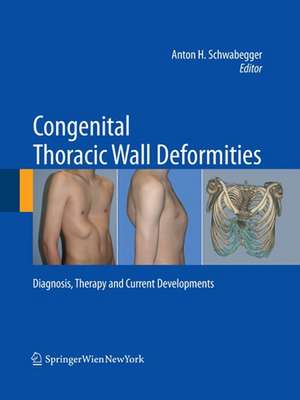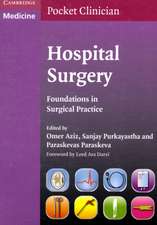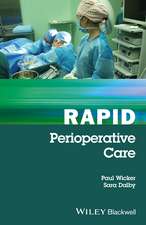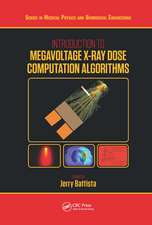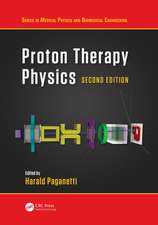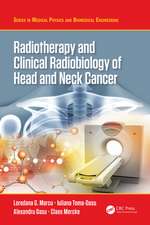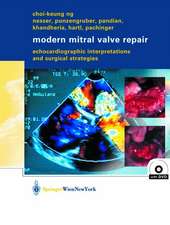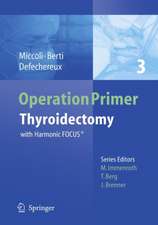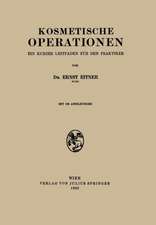Congenital Thoracic Wall Deformities: Diagnosis, Therapy and Current Developments
Editat de Anton H. Schwabeggeren Limba Engleză Paperback – 22 aug 2016
This book should not be seen as an operation atlas but more as a compact survey of a small group of medical conditions and the need for flexible options for an individual therapeutic approach, based on the combined experience of different international specialists. Thus the book is designed for obstetricians, pediatricians, physicians and surgical specialists alike.
| Toate formatele și edițiile | Preț | Express |
|---|---|---|
| Paperback (1) | 1614.67 lei 6-8 săpt. | |
| SPRINGER VIENNA – 22 aug 2016 | 1614.67 lei 6-8 săpt. | |
| Hardback (1) | 1648.90 lei 3-5 săpt. | |
| SPRINGER VIENNA – 22 mai 2011 | 1648.90 lei 3-5 săpt. |
Preț: 1614.67 lei
Preț vechi: 1699.66 lei
-5% Nou
Puncte Express: 2422
Preț estimativ în valută:
308.96€ • 323.45$ • 255.65£
308.96€ • 323.45$ • 255.65£
Carte tipărită la comandă
Livrare economică 05-19 aprilie
Preluare comenzi: 021 569.72.76
Specificații
ISBN-13: 9783709119105
ISBN-10: 3709119103
Pagini: 346
Ilustrații: XI, 346 p.
Dimensiuni: 210 x 279 mm
Greutate: 0.81 kg
Ediția:Softcover reprint of the original 1st ed. 2011
Editura: SPRINGER VIENNA
Colecția Springer
Locul publicării:Vienna, Austria
ISBN-10: 3709119103
Pagini: 346
Ilustrații: XI, 346 p.
Dimensiuni: 210 x 279 mm
Greutate: 0.81 kg
Ediția:Softcover reprint of the original 1st ed. 2011
Editura: SPRINGER VIENNA
Colecția Springer
Locul publicării:Vienna, Austria
Cuprins
Preverb
1. Introduction Historical treatment
2. Deformities of the anterior thoracic wall
2.1 Anatomy and function of the thoracic cage
2.2. Etiology, Genetics
2.3. Classification/Definition (Description of typical deformities )
2.3.1. Funnel chest
Subgroups
2.3.2. Keel Chest
Subgroups
2.3.3. Pectus arcuatum
2.3.4. Mixed Deformities
2.3.5. Cleft Sternum
2.3.6. Poland Syndrome, Amazone Syndrome
2.3.7. Other congenital anomalies of the thoracic wall
3. Diagnostics
3.1. Photography
3.2. Measurement circle
3.3. X-ray
3.4. CT-scan
3.5. Volume rendering three-dimensional-CT reconstruction
3.6. Ergometry
3.7. Psychological investigation
4. Aspects of indication setting for selection of individual therapy
5. Therapy
5.1. Basic surgical techniques, principles, methods of skin incision
5.2. Patient positioning
5.3. Special surgical techniques
5.3.1. Surgery of the funnel chest
5.3.1.1. MIRPE, the Nuss technique
in children
in adults
5.3.1.2. Custom-made silicone implant
5.3.1.3. The Ravitch procedure
5.3.1.4. The Erlangen methode
5.3.1.5. The Leonard procedure
5.3.1.6. Vacuum bell after Klobe (non surgical)
5.3.1.7. Autologuous tissue implantation
5.3.1.7.1. Cartilage chips
5.3.1.7.2. Lipofilling
5.3.1.7.3. Local flaps
5.3.1.7.4. Mikrovascular flaps
5.3.1.7.5. Mikrovascular sternum turn-over
5.3.1.8. Special technical aspects, thoracoscopy
5.3.1.9. Special anaesthetical aspects,
double lumen intubation, pain control
5.3.1.10. Combined surgey of funnel chest with associated anomalies or diseases
5.3.1.11. Pectus bar removal technique
5.3.2. Surgery of the keel chest
5.3.2.1. The Ravitch technique
5.3.2.2. Modification with bioabsorbable implants and muscle splitting technique, the Innsbruck concept
5.3.2.3. Special after-treatment, keel chest device
5.3.3. Surgery of Pectus arcuatum
5.3.4. Surgery of mixed deformities
5.3.5. Surgery of Poland syndrome, Amazone syndrome
free flaps for treatment of Poland Syndrome
5.3.6. Surgery of other congenital anomalies of the anterior thoracic wall
6. Complications, special problems
7. Follow-up, long term follow-up
8. Special instruments
9. Actual technical improvements, future aspects, 3 D Scanning and computerized remodelling
10. List of authors
Index
1. Introduction Historical treatment
2. Deformities of the anterior thoracic wall
2.1 Anatomy and function of the thoracic cage
2.2. Etiology, Genetics
2.3. Classification/Definition (Description of typical deformities )
2.3.1. Funnel chest
Subgroups
2.3.2. Keel Chest
Subgroups
2.3.3. Pectus arcuatum
2.3.4. Mixed Deformities
2.3.5. Cleft Sternum
2.3.6. Poland Syndrome, Amazone Syndrome
2.3.7. Other congenital anomalies of the thoracic wall
3. Diagnostics
3.1. Photography
3.2. Measurement circle
3.3. X-ray
3.4. CT-scan
3.5. Volume rendering three-dimensional-CT reconstruction
3.6. Ergometry
3.7. Psychological investigation
4. Aspects of indication setting for selection of individual therapy
5. Therapy
5.1. Basic surgical techniques, principles, methods of skin incision
5.2. Patient positioning
5.3. Special surgical techniques
5.3.1. Surgery of the funnel chest
5.3.1.1. MIRPE, the Nuss technique
in children
in adults
5.3.1.2. Custom-made silicone implant
5.3.1.3. The Ravitch procedure
5.3.1.4. The Erlangen methode
5.3.1.5. The Leonard procedure
5.3.1.6. Vacuum bell after Klobe (non surgical)
5.3.1.7. Autologuous tissue implantation
5.3.1.7.1. Cartilage chips
5.3.1.7.2. Lipofilling
5.3.1.7.3. Local flaps
5.3.1.7.4. Mikrovascular flaps
5.3.1.7.5. Mikrovascular sternum turn-over
5.3.1.8. Special technical aspects, thoracoscopy
5.3.1.9. Special anaesthetical aspects,
double lumen intubation, pain control
5.3.1.10. Combined surgey of funnel chest with associated anomalies or diseases
5.3.1.11. Pectus bar removal technique
5.3.2. Surgery of the keel chest
5.3.2.1. The Ravitch technique
5.3.2.2. Modification with bioabsorbable implants and muscle splitting technique, the Innsbruck concept
5.3.2.3. Special after-treatment, keel chest device
5.3.3. Surgery of Pectus arcuatum
5.3.4. Surgery of mixed deformities
5.3.5. Surgery of Poland syndrome, Amazone syndrome
free flaps for treatment of Poland Syndrome
5.3.6. Surgery of other congenital anomalies of the anterior thoracic wall
6. Complications, special problems
7. Follow-up, long term follow-up
8. Special instruments
9. Actual technical improvements, future aspects, 3 D Scanning and computerized remodelling
10. List of authors
Index
Recenzii
From the reviews:
“The book is an excellent source of the huge variety of available surgical and nonsurgical options and what might be expected from each. … It will appeal to … audience who share the fascination with pectus deformities and struggle with their correction. This would include primarily pediatric surgeons, fellows training in that area, and some plastic surgeons. … This is large, thorough, inclusive, well-illustrated book … .” (Robert M. Arensman, Doody’s Review Service, July, 2012)
“The book is an excellent source of the huge variety of available surgical and nonsurgical options and what might be expected from each. … It will appeal to … audience who share the fascination with pectus deformities and struggle with their correction. This would include primarily pediatric surgeons, fellows training in that area, and some plastic surgeons. … This is large, thorough, inclusive, well-illustrated book … .” (Robert M. Arensman, Doody’s Review Service, July, 2012)
Caracteristici
Compact survey of diagnosis, treatment and future options of congenital thoracic anomalies
Combined experience of international experts
Multidisciplinary approach
Combined experience of international experts
Multidisciplinary approach
